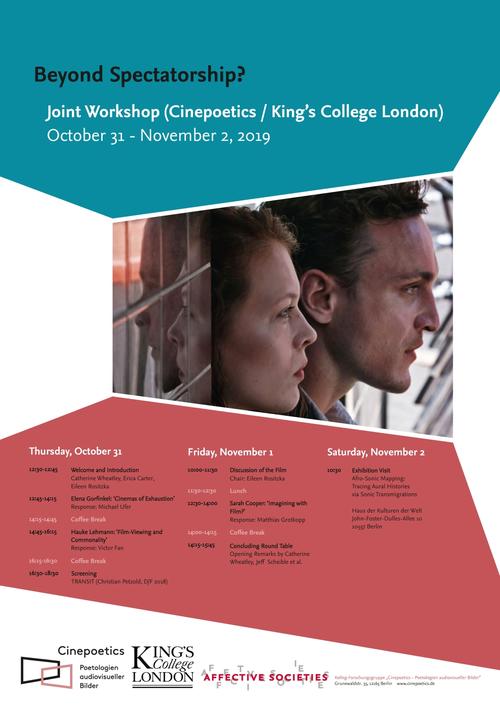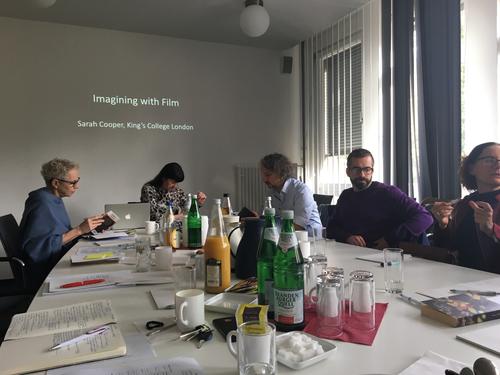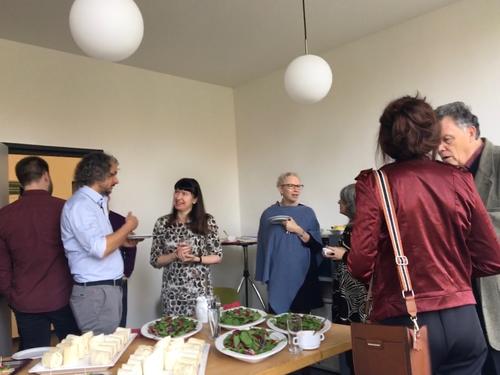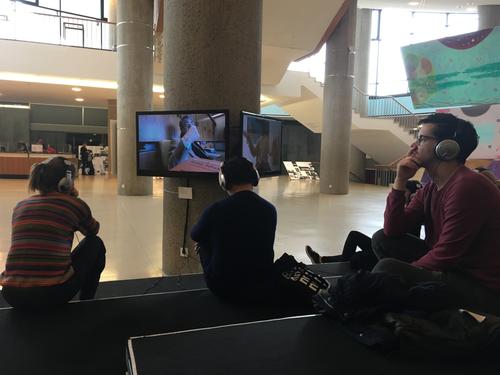Beyond Spectatorship?
31.10. – 02.11.2019 | Workshop by the Cinepoetics group and the King's College London with Erica Carter, Catherine Wheatley, Elena Gorfinkel, Jeff Scheible und Sarah Cooper.
Research Focus: Spectatorship and Beyond
The joint workshop on what lies beyond spectatorship was the result of an ongoing collaboration between Cinepoetics and King's College London. After a first productive meeting last year in London, the center was happy to welcome our British colleagues in Berlin. The following days' discussions would evolve around the topics of agency, genre, commonality as well as questions of individuation with regard to the (bio-)politics of spectatorship.
The event began with an introduction given by the organizers, Erica Carter, Catherine Wheatley, and Eileen Rositzka, including the basic observation that there would be no "universal" spectatorship theory to start from; rather, "spectatorship" could be regarded as a point of discursive intersection—from Adam Lowenstein’s very loose definition of spectatorship as "the interaction that takes place between viewers and films" to Judith Mayne's argument that it would also describe a relationship living on once the spectator "leaves the theater." These quite flexible accounts also raised an essential question: how exactly can the activity of film spectators be grasped as an act of appropriation that entails the creation of spatial and temporal logics—potentially shared by many?
This pointed to a general dissatisfaction in film studies and spectatorship theory to "speak for others." As Catherine Wheatley pointed out with reference to Stanley Cavell, the question of who has the right to speak in the "first-person plural" is not normative, but rather an invitation to test something out and be part of a community, to share perspectives and experience contradiction. Which might also prompt us to ask: What do films want from us, and what do we want from them?
The first talk on Thursday featured Elena Gorfinkel’s thoughts on what she called "cinema of exhaustion." In her presentation, Gorfinkel seeked to complicate discourses on slow and durational cinema by prioritizing corporeality, energy, and performance labour. A short response by Michael Ufer underlined the relevance of this approach to corporeal film viewing for the center's research on spectatorship and affectivity.
Hauke Lehmann further specified these accounts in his talk on film-viewing and commonality. Introducing these important notions for his own research, he also referred to several publications on commonality by Cinepoetics co-director Hermann Kappelhoff. His presentation was met with a short response by Victor Fan. Afterwards, the group attended the screening of Christian Petzold’s Transit (D/F 2018), a point of reference for several of the workshop's central topics.
On Friday, these references were made graspable by Eileen Rositzka’s introduction to the film, and also in the open discussion that followed. She highlighted the film's playing with intersubjectivity and ghostly presence, while also underlining the role of the body as placeholder and asking in what ways the "now" of the film would relate to the "now" of our film-viewing. In her subsequent talk on "Imagining with film?," Sarah Cooper took up these notions and underlined the importance of spectatorship for imagining with film – as opposed to mere depictions of imagining. This was met with a short response talk by Matthias Grotkopp highlighting the modes of experience he analysed in his genre-analytical work on Petzold.
A concluding discussion brought together perspectives on working with film shared by both Cinepoetics and the researchers of King's College. Introductory remarks by Catherine Wheatley and Jeff Scheible examined multiple possibilities of cooperation on different levels that were further discussed. The exchange of scholarly perspectives throughout the group continued on Saturday, during a joint excursion to the exhibition "Afro-Sonic Mapping: Tracing Aural Histories via Sonic Transmigrations" at Haus der Kulturen der Welt.



